A student wishes to study the cell structure under a light microscope having 10X eyepece and 45 X objective. He should illuminate the object by which one of the following colours of light so as to get the best possible resolution
Blue
Green
Yellow
Red
The correct Answer is:A
Step by step video, text & image solution for A student wishes to study the cell structure under a light microscope having 10X eyepece and 45 X objective. He should illuminate the object by which one of the following colours of light so as to get the best possible resolution by Biology experts to help you in doubts & scoring excellent marks in Class 11 exams.
Updated on:21/07/2023Topper's Solved these Questions
Similar Questions
An electrical circuit made by a student is incomplete because one of the wires is too short to connect with the other wire as shown in the given figure. In order to glow the bulb, he has to connect the open end by inserting an object between them.

Which of the following objects should the students insert between the open ends?
View SolutionAn electric circuit made by a student is incomplete because one of the wires is too short to connect with the other wire as shown in the given figure. In order to glow the bulb, he has to connect the open ends by inserting an object between them.
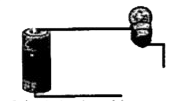
Which of the following objects should the student insert between the open ends?
View Solution
Knowledge Check
A group of PUC students are appearing for a biology practical examination. One of the practical problems is to identify the slide focused under a microscope. When they observe, they see a structure more or less spherical having an outer most layer which is green in colour and in the middle many of parenchyma cells and a number of skull-shaped bundles are arranged irregularly all around. Help them in identifying the structure properly.
AIt is the transfer section of a dicot stem.BIt is the transfer section of a monocot root.CIt is the transfer section of a di cot leaf.DIt is the transfer section of a monocot stem.The transition metals and their compounds have paramagnetic properties. This is due to the reason that ions of transition metals have unpaired electrons in (n-1)d orbitals. As the number of unpaired Sc to Mn, the paramagnetic character increases accodingly. From Mn onwards, this character decreases as electrons get paired up. The paramagnetic behaviour is expressed in terms of magnetic moment which is because of the spin of unpaired electron (n). It is given as Magnetic moment =√n(n+2)B.M
Majority of transition metal compounds are coloured both in solid state as well as in aqueous solution. due to d-d transition in which unpaired electrons from the lower energy d-orbitals are transferred to higher energy d-orbitals. The energy of this transition correspond to the radiation in visibe region. Thus, when white light falls on such a transition metal compound, some light energy corresponding to a particular colour is absorbed and one or more electrons are raised from lower energy set of orbitals to those of higher energy. With the absorption of radiations corresponding to specific colour from the white light, a colour known asd the complementary colour is observed or transmitted.
For which one of the following ions, the colour is not due to a d-d transition:ACrO2−4BCu(NH3)2+4CTi(H2O)3+6DCoF3−6Case : Noor, a young student, was trying to demonstrate some properties of light in her Science project work. She kept 'X' inside the box (as shown in the figure) and with the help of a laser pointer made light rays pass through the holes on one side of the box. She had a small butter-paper screen to see the spots of light being cast as they emerged.
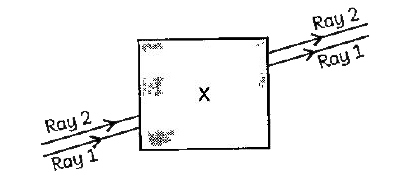
If the object inside the box was made of a material with a refractive index less than 1.5 then the :Alateral shift of the rays would have been less.Blateral shift of the rays would have been more.Clateral shift of the rays would remain the same as before.Dthere is not enough information to comment on any of the above statements
Noor, a young student, was trying to demonstrate some properties of light in her Science project work. She kept ‘X’ inside the box (as shown in the figure) and with the help of a laser pointer made light rays pass through the holes on one side of the box. She had a small butter-paper screen to see the spots of light being cast as they emerged.
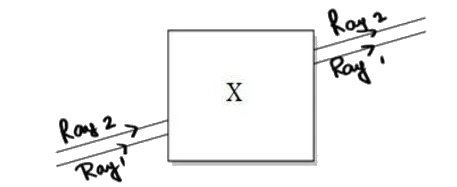
If the object inside the box was made of a material with a refractive index less than 1.5 then the
View SolutionNoor, a young student, was trying to demonstrate some properties of light in her Science project work. She kept ‘X’ inside the box (as shown in the figure) and with the help of a laser pointer made light rays pass through the holes on one side of the box. She had a small butter-paper screen to see the spots of light being cast as they emerged.
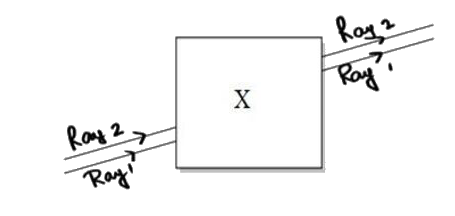
Her friend noted the following observations from this demonstration:
i. Glass is optically rarer than air.
ii. Air and glass allow light to pass through them with the same velocity.
iii. Air is optically rarer than glass.
iv. Speed of light through a denser medium is faster than that of a rarer medium.
v. The ratio: sin of angle of incidence in the first medium to the ratio of sin of angle of refraction in the second medium, gives the refractive index of the second material with respect to the first one.
Which one of the combination of the above statements given below is correct.
View SolutionThe given diagram represent the structure of a flower. Study the structure
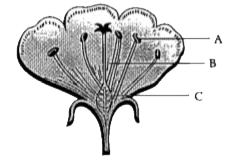
A student decides to study the impact of removing certain flower parts on fruit formation in plant species X. He chooses three separate plants that are growing in the same plot under uniform conditions. The data is given in the table below.
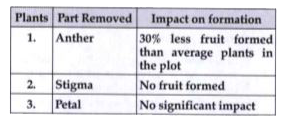
Which of the following can be inferred from the above data?
View SolutionThe figure shows the path of a ray of light, through a rectangular glass block in a liquid of uniform density.
(a) Does the light speed up or slow down in glass ?
Give reason to your answer.
(b) What is angular deviation of the emergent ray from the glass block with respect to the incident ray ?
(c) Show with the help of ray diagram the path of the ray which incidents normally the the first surface of the glass block through the block and the liquid.
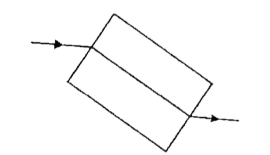
(d) What should be the ratio of the speed of light through the liquid to the speed through the glass so that there is no refraction of light at the boundaries of the glass when the system is illuminated by light of one colour ?
(e) What is the relation between angle of incidence i and angle of refraction r in the glass ?
View SolutionCase : Noor, a young student, was trying to demonstrate some properties of light in her Science project work. She kept 'X' inside the box (as shown in the figure) and with the help of a laser pointer made light rays pass through the holes on one side of the box. She had a small butter-paper screen to see the spots of light being cast as they emerged.
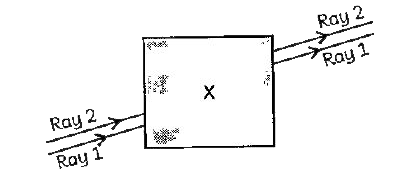
Her friend noted the following observations from this demonstration:
(I) Glass is optically rarer than air.
(II) Air and glass allow light to pass through them with the same velocity.
(III) Air is optically rarer than glass.
(IV) Speed of light through a denser medium is faster than that of a rarer medium.
(V) The ratio: sin of angle of incidence in the first medium to the ratio of sin of angle of refraction in the second medium, gives the refractive index of the second material with respect to the first one.
Which one of the combination of the above statements given below is correct.
View Solution
